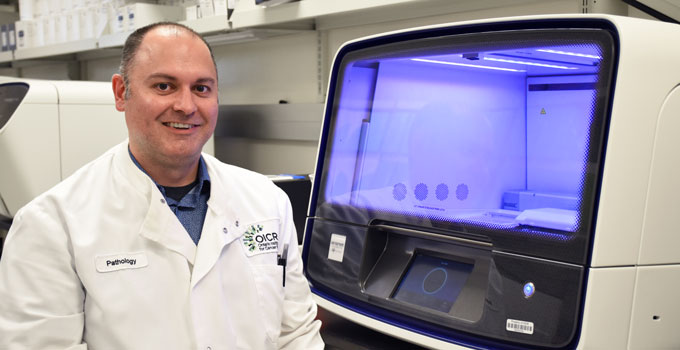
Genome Canada, Ontario Institute for Cancer Research and Thermo Fisher Scientific to focus on pancreatic, prostate and breast cancer
CARLSBAD, Calif. – (July 30, 2019) – Genome Canada, the Ontario Institute for Cancer Research (OICR) and Thermo Fisher Scientific are collaborating to develop a complete solution of targeted next generation sequencing (NGS) assays and analysis software designed to more effectively assess – and eventually improve management of – pancreatic, prostate and breast cancer.
The $6 million, three-year initiative aims to standardize advanced molecular profiling in these disease areas and make the assays commercially available globally. Focusing on rapid genomic diagnostics in pancreatic cancer and targeting treatment in breast and prostate cancers, the partnership builds on previous clinical research between OICR and Thermo Fisher and will inform development of three assays that will be utilized to stratify patients in clinical trials in Ontario and other jurisdictions.
“By supporting research and clinical trials, Genome Canada is helping to put more of Ontario’s innovative cancer diagnostics research into clinical use,” said Dr. John Bartlett, program director, diagnostic development at OICR. “This project has the potential to springboard advanced next-generation sequencing to routine clinical use in Ontario and across Canada.”
Breast and prostate cancer are among the most common types of cancer in Canada, and the country’s five-year net survival rate for pancreatic cancer is only 8 percent. However, there is clear evidence that patient outcomes can be improved with NGS-based testing strategies. A recent U.S. health economics study has shown that advanced cancer patients who received treatment based on NGS testing results experienced double the length of progression-free survival without increasing health care costs.1
While some solutions analyze only DNA sequences, the new targeted NGS assays will provide comprehensive genomic profiles by simultaneously assessing DNA and expression signatures from RNA to provide significantly more insight into driver mutations. The OICR/Thermo Fisher team will leverage this advantage by supplementing the new assays with unique DNA/RNA stratification biomarkers – specific to pancreatic, prostate and breast cancer – previously qualified by OICR translational researchers.
The collaboration is partly funded with a grant from Genome Canada through the Genomic Applications Partnership Program (GAPP). Genome Canada will contribute $2 million, the highest possible level of funding support, with the balance split between OICR and Thermo Fisher, which will cover development costs and validation activities.
Previous research collaborations led by OICR and Thermo Fisher are already well on their way to impacting cancer treatment in the future. Of particular note is a 2016 study designed to identify mutations and copy number variation changes in breast cancer, and clinical research utilizing the Oncomine Comprehensive Assay, which also supports both the National Cancer Institute’s Adult and Pediatric MATCH trials in the United States.
“OICR is a leader in clinical research, with extensive clinical trials in progress to improve care for patients with pancreatic, prostate and breast cancer,” said Jeff Smith, global lead of NGS precision medicine initiatives, clinical NGS and oncology for Thermo Fisher Scientific. “When OICR approached our team with the idea for this project, we saw it as another exciting for opportunity to bring Thermo Fisher’s proven Ion Torrent technology to clinical laboratories across Canada and to contribute to future improvement of patient care.”
1 “A Retrospective Analysis of Precision Medicine Outcomes in Patients With Advanced Cancer Reveals Improved Progression- Free Survival Without Increased Health Care Costs,” Journal of Oncology Practice, Vol 13, Issue 2, February 2017
